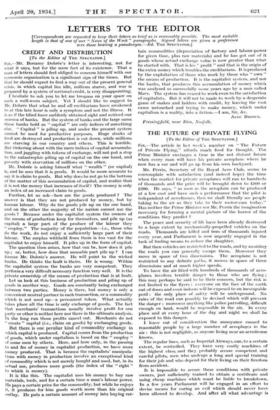LETTERS TO THE EDITOR [Correspondents are requested to keep their
letters as brief as is reasonably possible. The most suitable length is that of one of our " News of the Week" paragraphs. Signed letters are given a preference over those bearing a pseudonym.—Ed. Tim SPECTATOR.]
CREDIT AND DISTRIBUTION
[To the Editor of THE SPECTATOR.]
Sut,—Mr. Bonamy Dobree's letter is interesting, not for what it says, but for the mere fact of its existence. That a man of letters should feel obliged to concern himself with our economic organization is a significant sign of the times. But that he should expect to find a way out of the present general crisis, in which capital lies idle,. millions starve, and war is prepared by a system of national credit, is very disappointing.
I hesitate to ask you to let me trespass on your space on such a well-worn subject. Yet I should like to suggest to Mr. Dobree that what he and all creditarians have awakened to at this late hour is only a symptom and not the illness. It is as if the blind have suddenly obtained sight and noticed our eczema of banks. But the system of banks and the large sums these banks hold as " capital " are only indices of something else. " Capital " is piling up, and under the present system cannot be used for productive purposes. Huge stocks of food are destroyed and production is cut down, while millions are starving in our country and others. This is terrible. But tinkering about with the mere indices of capital accumula- tion. and juggling with tokens of exchange, will not put a stop to the catastrophic piling up of capital on the one hand, and poverty with starvation of millions on the other.
Mr. Dobree is asking himself what " wealth " (or capital) is, and he sees that it is goods. It would be more accurate to say it is claim to goods. But why does he not go to the bottom of the matter of this accumulation of capital, and realize that it is not the money that increases of itself? The money is only an index of an increased claim to goods.
Further, let us ask—how are the goods produced ? The answer is that they are not produced by money, but by human labour. Why do the goods pile up on the one hand, and on the other the majority of the nation cannot use the goods ? Because under the capitalist system the owners of the means of production keep for themselves, and pile up (as capital) a large part of the produce of the labour they " employ." The majority of the population—i.e., those who do the work, do not enjoy a sufficiently large part of their labour. The surplus withheld from them is too vast for the capitalist to enjoy himself. It piles up in the form of capital.
The question then arises, how that can be, how does it pile up ; or, better, how does that unusable part pile up ? I can foresee Mr. Dobree's answer. He will point to the wicked banks. He thinks the fault is theirs. He is wrong. Within the capitalist system the banks are very competent. They perform a very difficult necessary function very well. It is the private ownership of the means of production that is at fault.
Let us look at this business of production and piling up of goods in another way. Goods are constantly being exchanged between two parties. Money is there, but money is only a convenient neutral partner in each transaction, or a commodity which is not used up—a permanent token. What actually takes place all the time is only exchange of goods. The fact that merchants' transactions usually involve profit for one party or other is neither here nor there in the ultimate analysis. In the long run those profits cancel out. Merchants do not " create " capital (i.e., claim on goods) by exchanging goods.
But there is one peculiar kind of commodity exchange in which capital is produced. Capital comes from the production of goods, which under capitalism is based on the " employ " of some men by others. Here, and here only, in the passing to and fro of money in capitalist production, we have more money produced. That is because the capitalists' manipula- tions with money in production involve an exceptional kind of commodity which is not merely bought and used, but, in its actual use, produces more goods (the index of the " right " to which is money).
It is like this. The capitalist uses his money to buy raw materials, tools, and for a certain time a man's labour power. He pays a certain price for the commodity, but while he enjoys it, it produces for him goods worth more than his original outlay. He puts a certain amount of money into buying cer-
tain commodities (depreciation of factory and labour-power for given time, plus raw materials) and he has got out of it goods whose actual exchange value is now greater than what he started with. That is his " profit " and that is the origin of the extra money which troubles the creditarians. It is produced by the exploitation of those who work by those who " own " the means of production. It is the capitalist system, and not the banks, that produces this accumulation of money which was analysed so successfully some years ago by a man called Marx. The system has ceased to work even to the satisfaction of capitalists. But it will not be made to work by a desperate game of snakes and ladders with credit, by leaving the root cause untouched and trying to make money, which under capitalism is a reality, into a fiction.—I am, Sir, &c.
ALEC BROWN.
Pressing field, near Diss, Norfolk.












































 Previous page
Previous page